Talent Management Strategies: A Case Study on Marks & Spencer Success
VerifiedAdded on 2023/01/06
|24
|5804
|42
Report
AI Summary
This report delves into the crucial aspects of talent management strategies and their impact on organizational success, using Marks & Spencer as a case study. It begins by defining talent management, its significance, and the benefits it offers, such as increased employee motivation, improved retention, and a positive workplace environment. The literature review explores the concept of managing talent, highlighting its importance in attracting and retaining skilled employees. The report then identifies various talent management strategies, including training and development, reward and recognition programs, and the cultivation of a positive organizational culture. The research methodology employs a positivism philosophy and a deductive approach, utilizing a quantitative survey strategy with questionnaires distributed to 25 employees of Marks & Spencer. The data analysis and interpretation section presents findings related to the significance of managing talent. The report concludes with recommendations and a reflection on the findings, emphasizing the importance of effective talent management for achieving competitive advantage and organizational goals.
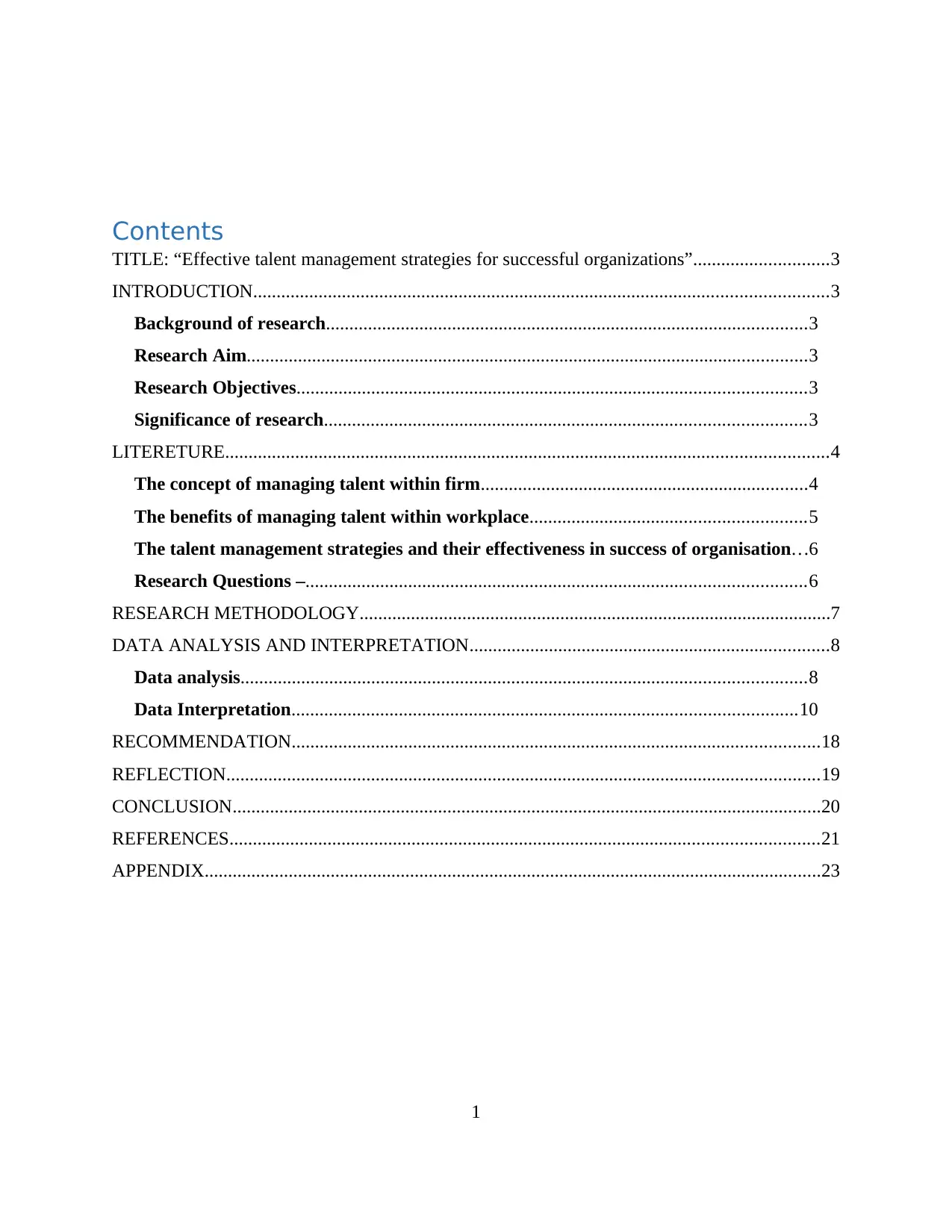
Contents
TITLE: “Effective talent management strategies for successful organizations”.............................3
INTRODUCTION...........................................................................................................................3
Background of research.......................................................................................................3
Research Aim........................................................................................................................3
Research Objectives.............................................................................................................3
Significance of research.......................................................................................................3
LITERETURE.................................................................................................................................4
The concept of managing talent within firm......................................................................4
The benefits of managing talent within workplace...........................................................5
The talent management strategies and their effectiveness in success of organisation...6
Research Questions –...........................................................................................................6
RESEARCH METHODOLOGY.....................................................................................................7
DATA ANALYSIS AND INTERPRETATION.............................................................................8
Data analysis.........................................................................................................................8
Data Interpretation............................................................................................................10
RECOMMENDATION.................................................................................................................18
REFLECTION...............................................................................................................................19
CONCLUSION..............................................................................................................................20
REFERENCES..............................................................................................................................21
APPENDIX....................................................................................................................................23
1
TITLE: “Effective talent management strategies for successful organizations”.............................3
INTRODUCTION...........................................................................................................................3
Background of research.......................................................................................................3
Research Aim........................................................................................................................3
Research Objectives.............................................................................................................3
Significance of research.......................................................................................................3
LITERETURE.................................................................................................................................4
The concept of managing talent within firm......................................................................4
The benefits of managing talent within workplace...........................................................5
The talent management strategies and their effectiveness in success of organisation...6
Research Questions –...........................................................................................................6
RESEARCH METHODOLOGY.....................................................................................................7
DATA ANALYSIS AND INTERPRETATION.............................................................................8
Data analysis.........................................................................................................................8
Data Interpretation............................................................................................................10
RECOMMENDATION.................................................................................................................18
REFLECTION...............................................................................................................................19
CONCLUSION..............................................................................................................................20
REFERENCES..............................................................................................................................21
APPENDIX....................................................................................................................................23
1
Paraphrase This Document
Need a fresh take? Get an instant paraphrase of this document with our AI Paraphraser
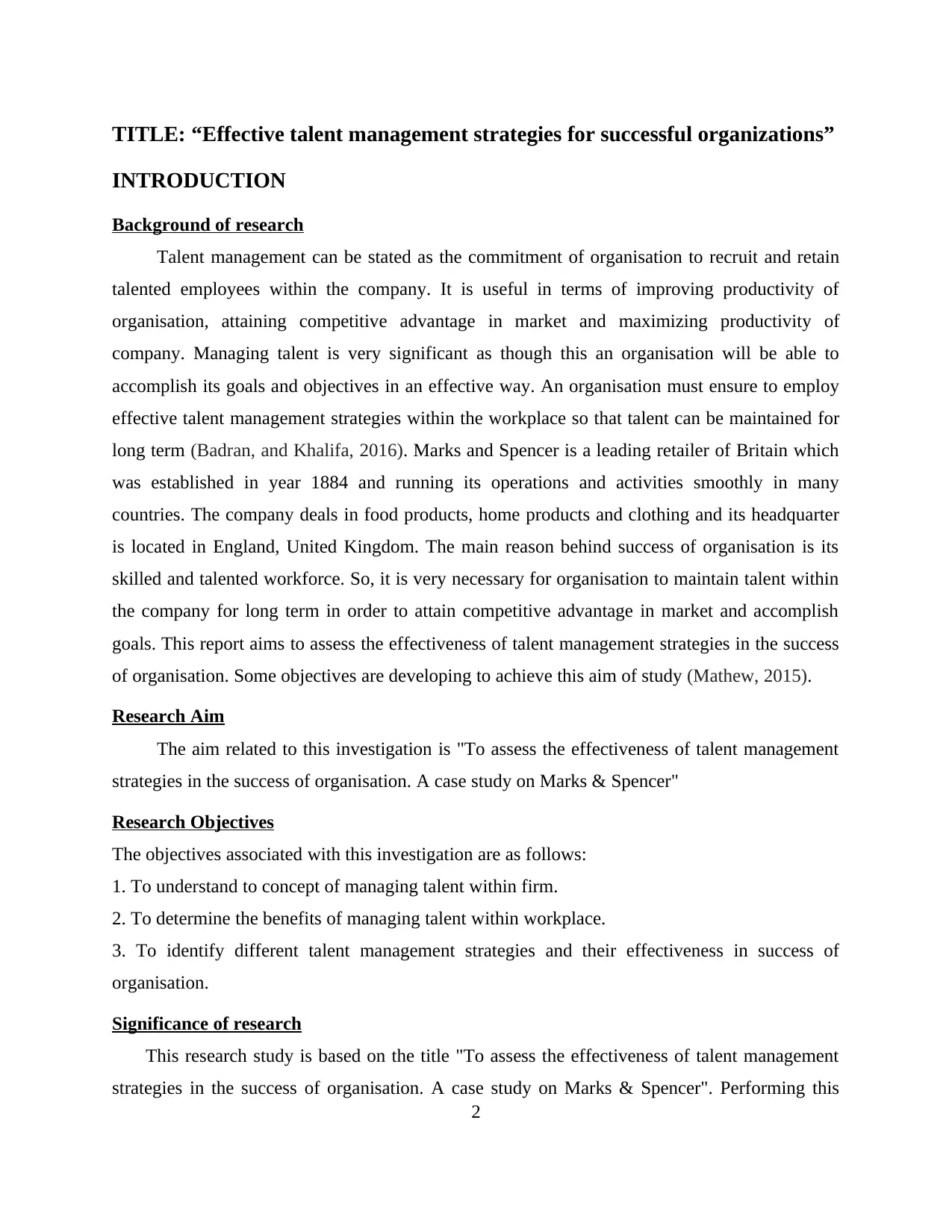
TITLE: “Effective talent management strategies for successful organizations”
INTRODUCTION
Background of research
Talent management can be stated as the commitment of organisation to recruit and retain
talented employees within the company. It is useful in terms of improving productivity of
organisation, attaining competitive advantage in market and maximizing productivity of
company. Managing talent is very significant as though this an organisation will be able to
accomplish its goals and objectives in an effective way. An organisation must ensure to employ
effective talent management strategies within the workplace so that talent can be maintained for
long term (Badran, and Khalifa, 2016). Marks and Spencer is a leading retailer of Britain which
was established in year 1884 and running its operations and activities smoothly in many
countries. The company deals in food products, home products and clothing and its headquarter
is located in England, United Kingdom. The main reason behind success of organisation is its
skilled and talented workforce. So, it is very necessary for organisation to maintain talent within
the company for long term in order to attain competitive advantage in market and accomplish
goals. This report aims to assess the effectiveness of talent management strategies in the success
of organisation. Some objectives are developing to achieve this aim of study (Mathew, 2015).
Research Aim
The aim related to this investigation is "To assess the effectiveness of talent management
strategies in the success of organisation. A case study on Marks & Spencer"
Research Objectives
The objectives associated with this investigation are as follows:
1. To understand to concept of managing talent within firm.
2. To determine the benefits of managing talent within workplace.
3. To identify different talent management strategies and their effectiveness in success of
organisation.
Significance of research
This research study is based on the title "To assess the effectiveness of talent management
strategies in the success of organisation. A case study on Marks & Spencer". Performing this
2
INTRODUCTION
Background of research
Talent management can be stated as the commitment of organisation to recruit and retain
talented employees within the company. It is useful in terms of improving productivity of
organisation, attaining competitive advantage in market and maximizing productivity of
company. Managing talent is very significant as though this an organisation will be able to
accomplish its goals and objectives in an effective way. An organisation must ensure to employ
effective talent management strategies within the workplace so that talent can be maintained for
long term (Badran, and Khalifa, 2016). Marks and Spencer is a leading retailer of Britain which
was established in year 1884 and running its operations and activities smoothly in many
countries. The company deals in food products, home products and clothing and its headquarter
is located in England, United Kingdom. The main reason behind success of organisation is its
skilled and talented workforce. So, it is very necessary for organisation to maintain talent within
the company for long term in order to attain competitive advantage in market and accomplish
goals. This report aims to assess the effectiveness of talent management strategies in the success
of organisation. Some objectives are developing to achieve this aim of study (Mathew, 2015).
Research Aim
The aim related to this investigation is "To assess the effectiveness of talent management
strategies in the success of organisation. A case study on Marks & Spencer"
Research Objectives
The objectives associated with this investigation are as follows:
1. To understand to concept of managing talent within firm.
2. To determine the benefits of managing talent within workplace.
3. To identify different talent management strategies and their effectiveness in success of
organisation.
Significance of research
This research study is based on the title "To assess the effectiveness of talent management
strategies in the success of organisation. A case study on Marks & Spencer". Performing this
2
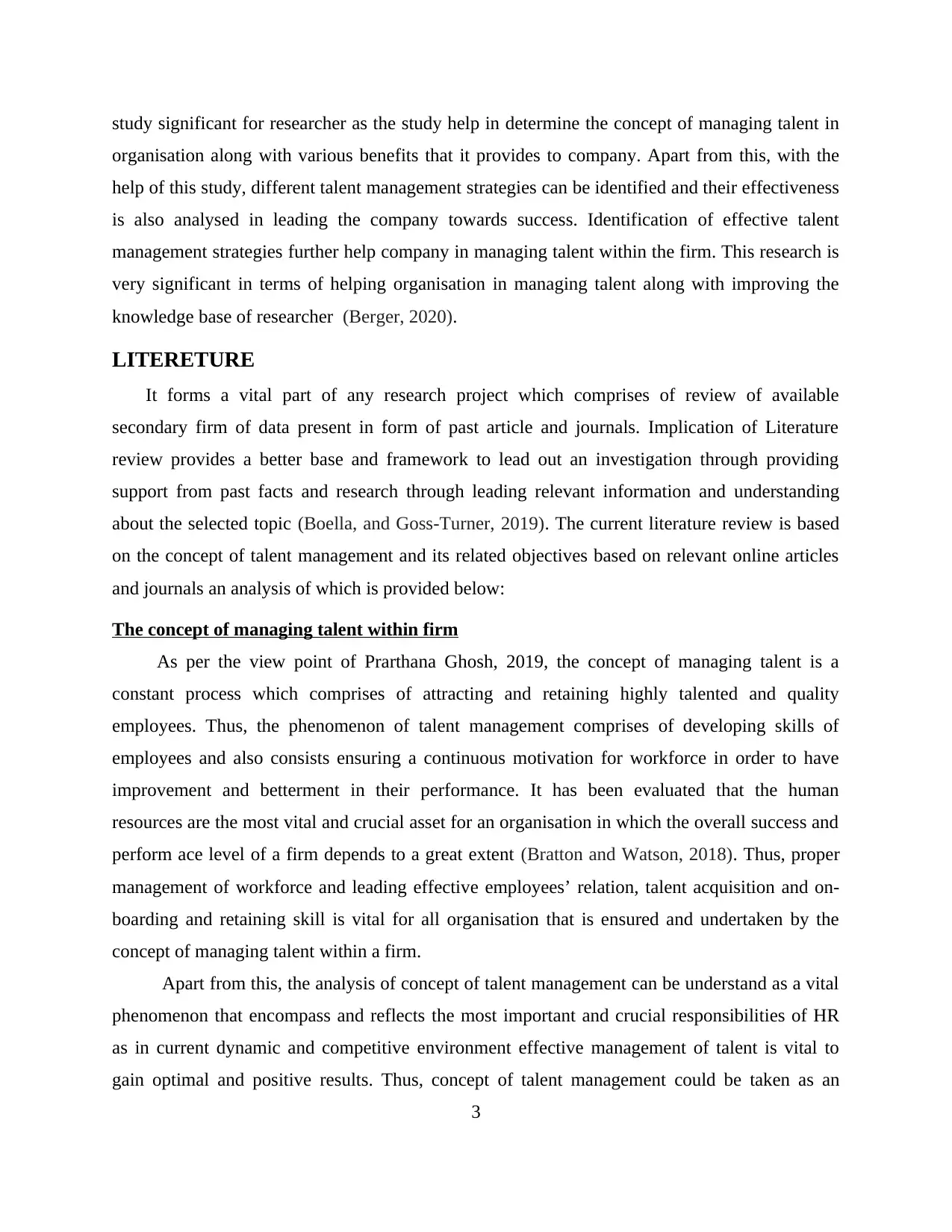
study significant for researcher as the study help in determine the concept of managing talent in
organisation along with various benefits that it provides to company. Apart from this, with the
help of this study, different talent management strategies can be identified and their effectiveness
is also analysed in leading the company towards success. Identification of effective talent
management strategies further help company in managing talent within the firm. This research is
very significant in terms of helping organisation in managing talent along with improving the
knowledge base of researcher (Berger, 2020).
LITERETURE
It forms a vital part of any research project which comprises of review of available
secondary firm of data present in form of past article and journals. Implication of Literature
review provides a better base and framework to lead out an investigation through providing
support from past facts and research through leading relevant information and understanding
about the selected topic (Boella, and Goss-Turner, 2019). The current literature review is based
on the concept of talent management and its related objectives based on relevant online articles
and journals an analysis of which is provided below:
The concept of managing talent within firm
As per the view point of Prarthana Ghosh, 2019, the concept of managing talent is a
constant process which comprises of attracting and retaining highly talented and quality
employees. Thus, the phenomenon of talent management comprises of developing skills of
employees and also consists ensuring a continuous motivation for workforce in order to have
improvement and betterment in their performance. It has been evaluated that the human
resources are the most vital and crucial asset for an organisation in which the overall success and
perform ace level of a firm depends to a great extent (Bratton and Watson, 2018). Thus, proper
management of workforce and leading effective employees’ relation, talent acquisition and on-
boarding and retaining skill is vital for all organisation that is ensured and undertaken by the
concept of managing talent within a firm.
Apart from this, the analysis of concept of talent management can be understand as a vital
phenomenon that encompass and reflects the most important and crucial responsibilities of HR
as in current dynamic and competitive environment effective management of talent is vital to
gain optimal and positive results. Thus, concept of talent management could be taken as an
3
organisation along with various benefits that it provides to company. Apart from this, with the
help of this study, different talent management strategies can be identified and their effectiveness
is also analysed in leading the company towards success. Identification of effective talent
management strategies further help company in managing talent within the firm. This research is
very significant in terms of helping organisation in managing talent along with improving the
knowledge base of researcher (Berger, 2020).
LITERETURE
It forms a vital part of any research project which comprises of review of available
secondary firm of data present in form of past article and journals. Implication of Literature
review provides a better base and framework to lead out an investigation through providing
support from past facts and research through leading relevant information and understanding
about the selected topic (Boella, and Goss-Turner, 2019). The current literature review is based
on the concept of talent management and its related objectives based on relevant online articles
and journals an analysis of which is provided below:
The concept of managing talent within firm
As per the view point of Prarthana Ghosh, 2019, the concept of managing talent is a
constant process which comprises of attracting and retaining highly talented and quality
employees. Thus, the phenomenon of talent management comprises of developing skills of
employees and also consists ensuring a continuous motivation for workforce in order to have
improvement and betterment in their performance. It has been evaluated that the human
resources are the most vital and crucial asset for an organisation in which the overall success and
perform ace level of a firm depends to a great extent (Bratton and Watson, 2018). Thus, proper
management of workforce and leading effective employees’ relation, talent acquisition and on-
boarding and retaining skill is vital for all organisation that is ensured and undertaken by the
concept of managing talent within a firm.
Apart from this, the analysis of concept of talent management can be understand as a vital
phenomenon that encompass and reflects the most important and crucial responsibilities of HR
as in current dynamic and competitive environment effective management of talent is vital to
gain optimal and positive results. Thus, concept of talent management could be taken as an
3
⊘ This is a preview!⊘
Do you want full access?
Subscribe today to unlock all pages.

Trusted by 1+ million students worldwide
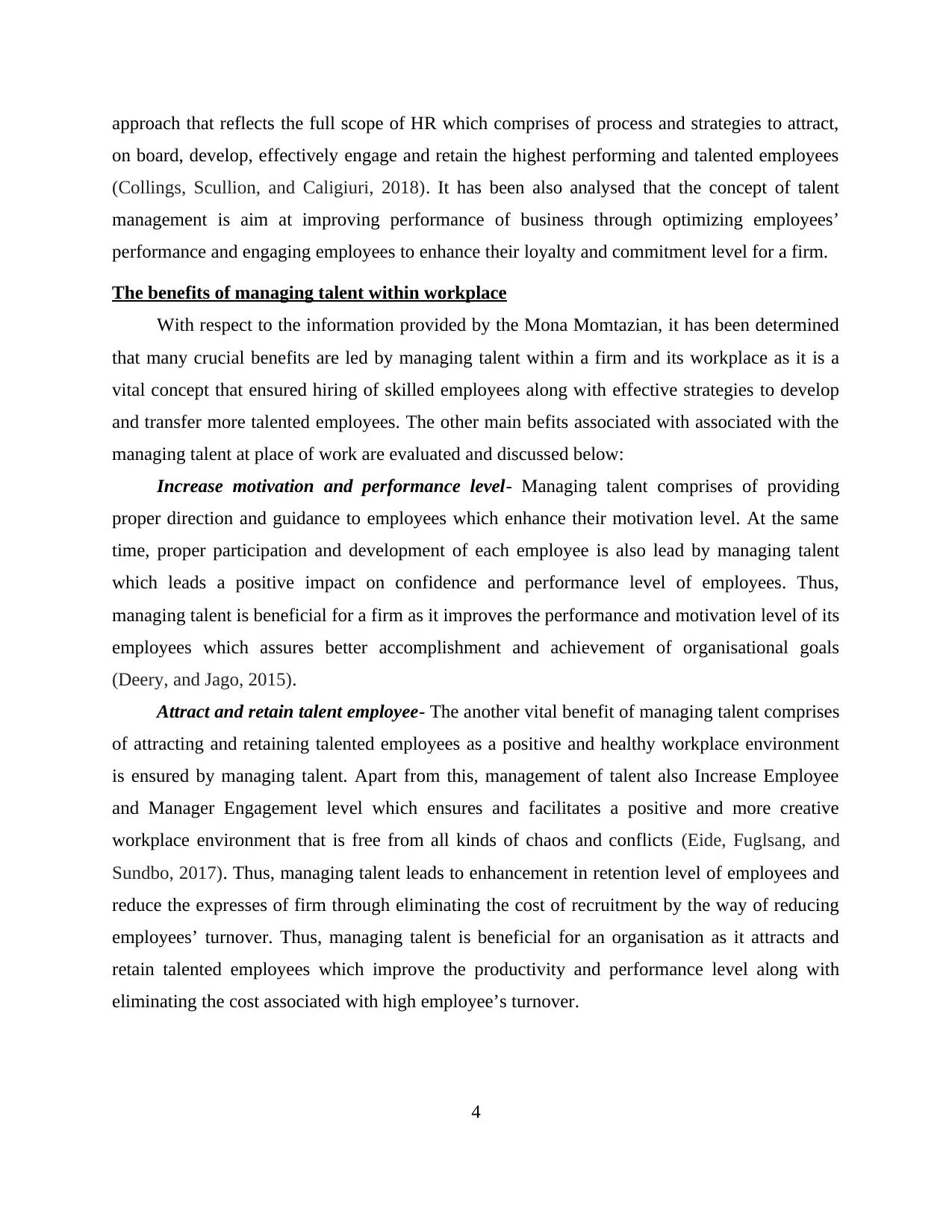
approach that reflects the full scope of HR which comprises of process and strategies to attract,
on board, develop, effectively engage and retain the highest performing and talented employees
(Collings, Scullion, and Caligiuri, 2018). It has been also analysed that the concept of talent
management is aim at improving performance of business through optimizing employees’
performance and engaging employees to enhance their loyalty and commitment level for a firm.
The benefits of managing talent within workplace
With respect to the information provided by the Mona Momtazian, it has been determined
that many crucial benefits are led by managing talent within a firm and its workplace as it is a
vital concept that ensured hiring of skilled employees along with effective strategies to develop
and transfer more talented employees. The other main befits associated with associated with the
managing talent at place of work are evaluated and discussed below:
Increase motivation and performance level- Managing talent comprises of providing
proper direction and guidance to employees which enhance their motivation level. At the same
time, proper participation and development of each employee is also lead by managing talent
which leads a positive impact on confidence and performance level of employees. Thus,
managing talent is beneficial for a firm as it improves the performance and motivation level of its
employees which assures better accomplishment and achievement of organisational goals
(Deery, and Jago, 2015).
Attract and retain talent employee- The another vital benefit of managing talent comprises
of attracting and retaining talented employees as a positive and healthy workplace environment
is ensured by managing talent. Apart from this, management of talent also Increase Employee
and Manager Engagement level which ensures and facilitates a positive and more creative
workplace environment that is free from all kinds of chaos and conflicts (Eide, Fuglsang, and
Sundbo, 2017). Thus, managing talent leads to enhancement in retention level of employees and
reduce the expresses of firm through eliminating the cost of recruitment by the way of reducing
employees’ turnover. Thus, managing talent is beneficial for an organisation as it attracts and
retain talented employees which improve the productivity and performance level along with
eliminating the cost associated with high employee’s turnover.
4
on board, develop, effectively engage and retain the highest performing and talented employees
(Collings, Scullion, and Caligiuri, 2018). It has been also analysed that the concept of talent
management is aim at improving performance of business through optimizing employees’
performance and engaging employees to enhance their loyalty and commitment level for a firm.
The benefits of managing talent within workplace
With respect to the information provided by the Mona Momtazian, it has been determined
that many crucial benefits are led by managing talent within a firm and its workplace as it is a
vital concept that ensured hiring of skilled employees along with effective strategies to develop
and transfer more talented employees. The other main befits associated with associated with the
managing talent at place of work are evaluated and discussed below:
Increase motivation and performance level- Managing talent comprises of providing
proper direction and guidance to employees which enhance their motivation level. At the same
time, proper participation and development of each employee is also lead by managing talent
which leads a positive impact on confidence and performance level of employees. Thus,
managing talent is beneficial for a firm as it improves the performance and motivation level of its
employees which assures better accomplishment and achievement of organisational goals
(Deery, and Jago, 2015).
Attract and retain talent employee- The another vital benefit of managing talent comprises
of attracting and retaining talented employees as a positive and healthy workplace environment
is ensured by managing talent. Apart from this, management of talent also Increase Employee
and Manager Engagement level which ensures and facilitates a positive and more creative
workplace environment that is free from all kinds of chaos and conflicts (Eide, Fuglsang, and
Sundbo, 2017). Thus, managing talent leads to enhancement in retention level of employees and
reduce the expresses of firm through eliminating the cost of recruitment by the way of reducing
employees’ turnover. Thus, managing talent is beneficial for an organisation as it attracts and
retain talented employees which improve the productivity and performance level along with
eliminating the cost associated with high employee’s turnover.
4
Paraphrase This Document
Need a fresh take? Get an instant paraphrase of this document with our AI Paraphraser
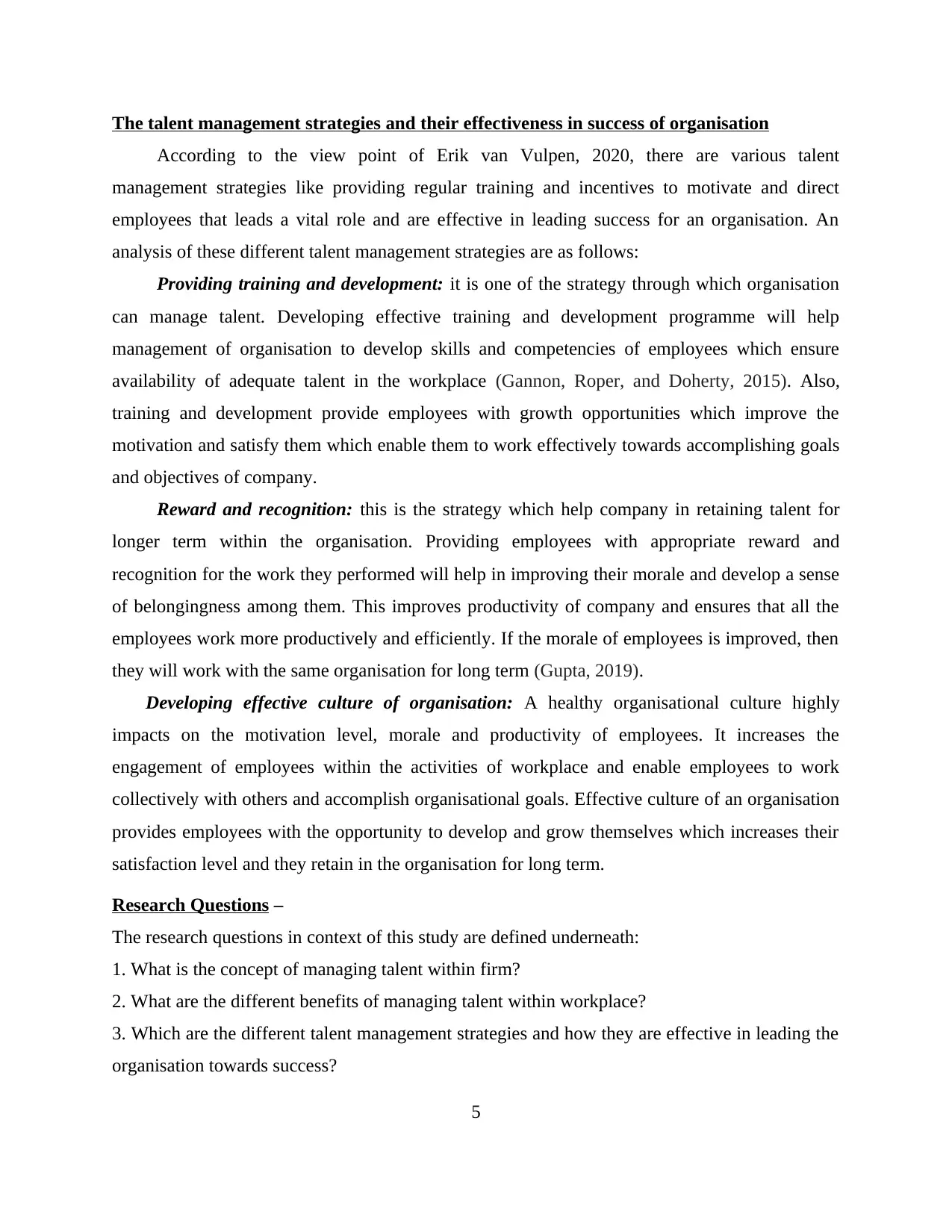
The talent management strategies and their effectiveness in success of organisation
According to the view point of Erik van Vulpen, 2020, there are various talent
management strategies like providing regular training and incentives to motivate and direct
employees that leads a vital role and are effective in leading success for an organisation. An
analysis of these different talent management strategies are as follows:
Providing training and development: it is one of the strategy through which organisation
can manage talent. Developing effective training and development programme will help
management of organisation to develop skills and competencies of employees which ensure
availability of adequate talent in the workplace (Gannon, Roper, and Doherty, 2015). Also,
training and development provide employees with growth opportunities which improve the
motivation and satisfy them which enable them to work effectively towards accomplishing goals
and objectives of company.
Reward and recognition: this is the strategy which help company in retaining talent for
longer term within the organisation. Providing employees with appropriate reward and
recognition for the work they performed will help in improving their morale and develop a sense
of belongingness among them. This improves productivity of company and ensures that all the
employees work more productively and efficiently. If the morale of employees is improved, then
they will work with the same organisation for long term (Gupta, 2019).
Developing effective culture of organisation: A healthy organisational culture highly
impacts on the motivation level, morale and productivity of employees. It increases the
engagement of employees within the activities of workplace and enable employees to work
collectively with others and accomplish organisational goals. Effective culture of an organisation
provides employees with the opportunity to develop and grow themselves which increases their
satisfaction level and they retain in the organisation for long term.
Research Questions –
The research questions in context of this study are defined underneath:
1. What is the concept of managing talent within firm?
2. What are the different benefits of managing talent within workplace?
3. Which are the different talent management strategies and how they are effective in leading the
organisation towards success?
5
According to the view point of Erik van Vulpen, 2020, there are various talent
management strategies like providing regular training and incentives to motivate and direct
employees that leads a vital role and are effective in leading success for an organisation. An
analysis of these different talent management strategies are as follows:
Providing training and development: it is one of the strategy through which organisation
can manage talent. Developing effective training and development programme will help
management of organisation to develop skills and competencies of employees which ensure
availability of adequate talent in the workplace (Gannon, Roper, and Doherty, 2015). Also,
training and development provide employees with growth opportunities which improve the
motivation and satisfy them which enable them to work effectively towards accomplishing goals
and objectives of company.
Reward and recognition: this is the strategy which help company in retaining talent for
longer term within the organisation. Providing employees with appropriate reward and
recognition for the work they performed will help in improving their morale and develop a sense
of belongingness among them. This improves productivity of company and ensures that all the
employees work more productively and efficiently. If the morale of employees is improved, then
they will work with the same organisation for long term (Gupta, 2019).
Developing effective culture of organisation: A healthy organisational culture highly
impacts on the motivation level, morale and productivity of employees. It increases the
engagement of employees within the activities of workplace and enable employees to work
collectively with others and accomplish organisational goals. Effective culture of an organisation
provides employees with the opportunity to develop and grow themselves which increases their
satisfaction level and they retain in the organisation for long term.
Research Questions –
The research questions in context of this study are defined underneath:
1. What is the concept of managing talent within firm?
2. What are the different benefits of managing talent within workplace?
3. Which are the different talent management strategies and how they are effective in leading the
organisation towards success?
5
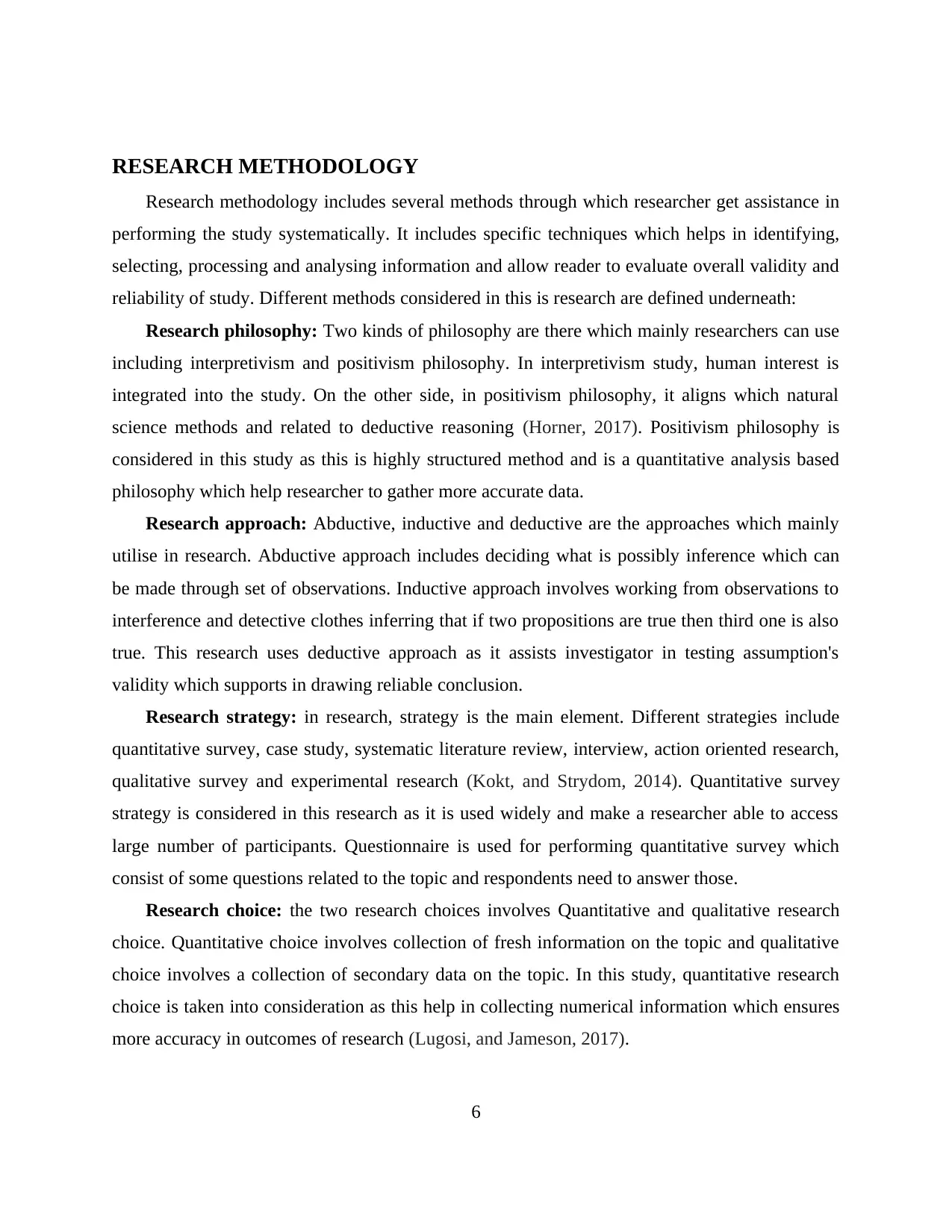
RESEARCH METHODOLOGY
Research methodology includes several methods through which researcher get assistance in
performing the study systematically. It includes specific techniques which helps in identifying,
selecting, processing and analysing information and allow reader to evaluate overall validity and
reliability of study. Different methods considered in this is research are defined underneath:
Research philosophy: Two kinds of philosophy are there which mainly researchers can use
including interpretivism and positivism philosophy. In interpretivism study, human interest is
integrated into the study. On the other side, in positivism philosophy, it aligns which natural
science methods and related to deductive reasoning (Horner, 2017). Positivism philosophy is
considered in this study as this is highly structured method and is a quantitative analysis based
philosophy which help researcher to gather more accurate data.
Research approach: Abductive, inductive and deductive are the approaches which mainly
utilise in research. Abductive approach includes deciding what is possibly inference which can
be made through set of observations. Inductive approach involves working from observations to
interference and detective clothes inferring that if two propositions are true then third one is also
true. This research uses deductive approach as it assists investigator in testing assumption's
validity which supports in drawing reliable conclusion.
Research strategy: in research, strategy is the main element. Different strategies include
quantitative survey, case study, systematic literature review, interview, action oriented research,
qualitative survey and experimental research (Kokt, and Strydom, 2014). Quantitative survey
strategy is considered in this research as it is used widely and make a researcher able to access
large number of participants. Questionnaire is used for performing quantitative survey which
consist of some questions related to the topic and respondents need to answer those.
Research choice: the two research choices involves Quantitative and qualitative research
choice. Quantitative choice involves collection of fresh information on the topic and qualitative
choice involves a collection of secondary data on the topic. In this study, quantitative research
choice is taken into consideration as this help in collecting numerical information which ensures
more accuracy in outcomes of research (Lugosi, and Jameson, 2017).
6
Research methodology includes several methods through which researcher get assistance in
performing the study systematically. It includes specific techniques which helps in identifying,
selecting, processing and analysing information and allow reader to evaluate overall validity and
reliability of study. Different methods considered in this is research are defined underneath:
Research philosophy: Two kinds of philosophy are there which mainly researchers can use
including interpretivism and positivism philosophy. In interpretivism study, human interest is
integrated into the study. On the other side, in positivism philosophy, it aligns which natural
science methods and related to deductive reasoning (Horner, 2017). Positivism philosophy is
considered in this study as this is highly structured method and is a quantitative analysis based
philosophy which help researcher to gather more accurate data.
Research approach: Abductive, inductive and deductive are the approaches which mainly
utilise in research. Abductive approach includes deciding what is possibly inference which can
be made through set of observations. Inductive approach involves working from observations to
interference and detective clothes inferring that if two propositions are true then third one is also
true. This research uses deductive approach as it assists investigator in testing assumption's
validity which supports in drawing reliable conclusion.
Research strategy: in research, strategy is the main element. Different strategies include
quantitative survey, case study, systematic literature review, interview, action oriented research,
qualitative survey and experimental research (Kokt, and Strydom, 2014). Quantitative survey
strategy is considered in this research as it is used widely and make a researcher able to access
large number of participants. Questionnaire is used for performing quantitative survey which
consist of some questions related to the topic and respondents need to answer those.
Research choice: the two research choices involves Quantitative and qualitative research
choice. Quantitative choice involves collection of fresh information on the topic and qualitative
choice involves a collection of secondary data on the topic. In this study, quantitative research
choice is taken into consideration as this help in collecting numerical information which ensures
more accuracy in outcomes of research (Lugosi, and Jameson, 2017).
6
⊘ This is a preview!⊘
Do you want full access?
Subscribe today to unlock all pages.

Trusted by 1+ million students worldwide
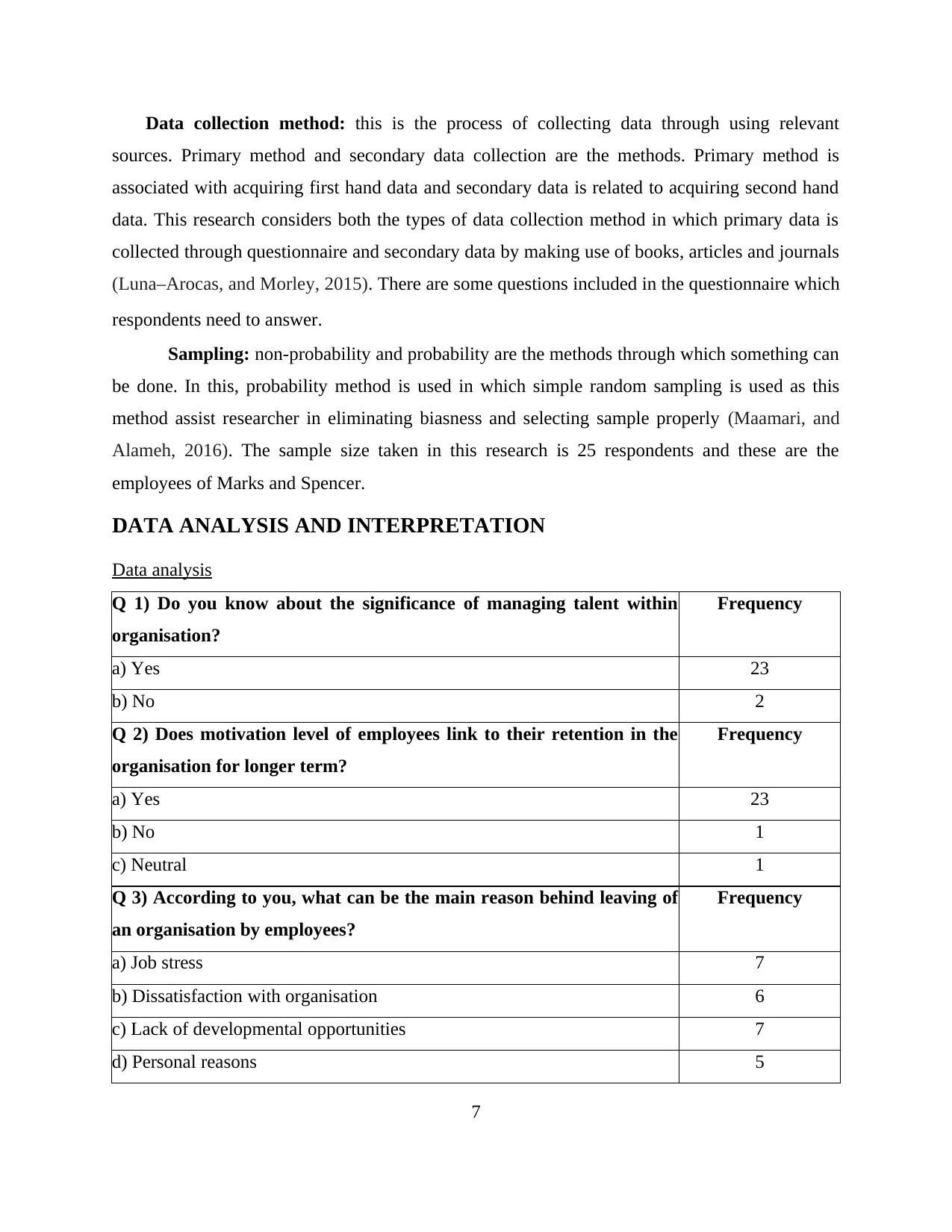
Data collection method: this is the process of collecting data through using relevant
sources. Primary method and secondary data collection are the methods. Primary method is
associated with acquiring first hand data and secondary data is related to acquiring second hand
data. This research considers both the types of data collection method in which primary data is
collected through questionnaire and secondary data by making use of books, articles and journals
(Luna–Arocas, and Morley, 2015). There are some questions included in the questionnaire which
respondents need to answer.
Sampling: non-probability and probability are the methods through which something can
be done. In this, probability method is used in which simple random sampling is used as this
method assist researcher in eliminating biasness and selecting sample properly (Maamari, and
Alameh, 2016). The sample size taken in this research is 25 respondents and these are the
employees of Marks and Spencer.
DATA ANALYSIS AND INTERPRETATION
Data analysis
Q 1) Do you know about the significance of managing talent within
organisation?
Frequency
a) Yes 23
b) No 2
Q 2) Does motivation level of employees link to their retention in the
organisation for longer term?
Frequency
a) Yes 23
b) No 1
c) Neutral 1
Q 3) According to you, what can be the main reason behind leaving of
an organisation by employees?
Frequency
a) Job stress 7
b) Dissatisfaction with organisation 6
c) Lack of developmental opportunities 7
d) Personal reasons 5
7
sources. Primary method and secondary data collection are the methods. Primary method is
associated with acquiring first hand data and secondary data is related to acquiring second hand
data. This research considers both the types of data collection method in which primary data is
collected through questionnaire and secondary data by making use of books, articles and journals
(Luna–Arocas, and Morley, 2015). There are some questions included in the questionnaire which
respondents need to answer.
Sampling: non-probability and probability are the methods through which something can
be done. In this, probability method is used in which simple random sampling is used as this
method assist researcher in eliminating biasness and selecting sample properly (Maamari, and
Alameh, 2016). The sample size taken in this research is 25 respondents and these are the
employees of Marks and Spencer.
DATA ANALYSIS AND INTERPRETATION
Data analysis
Q 1) Do you know about the significance of managing talent within
organisation?
Frequency
a) Yes 23
b) No 2
Q 2) Does motivation level of employees link to their retention in the
organisation for longer term?
Frequency
a) Yes 23
b) No 1
c) Neutral 1
Q 3) According to you, what can be the main reason behind leaving of
an organisation by employees?
Frequency
a) Job stress 7
b) Dissatisfaction with organisation 6
c) Lack of developmental opportunities 7
d) Personal reasons 5
7
Paraphrase This Document
Need a fresh take? Get an instant paraphrase of this document with our AI Paraphraser
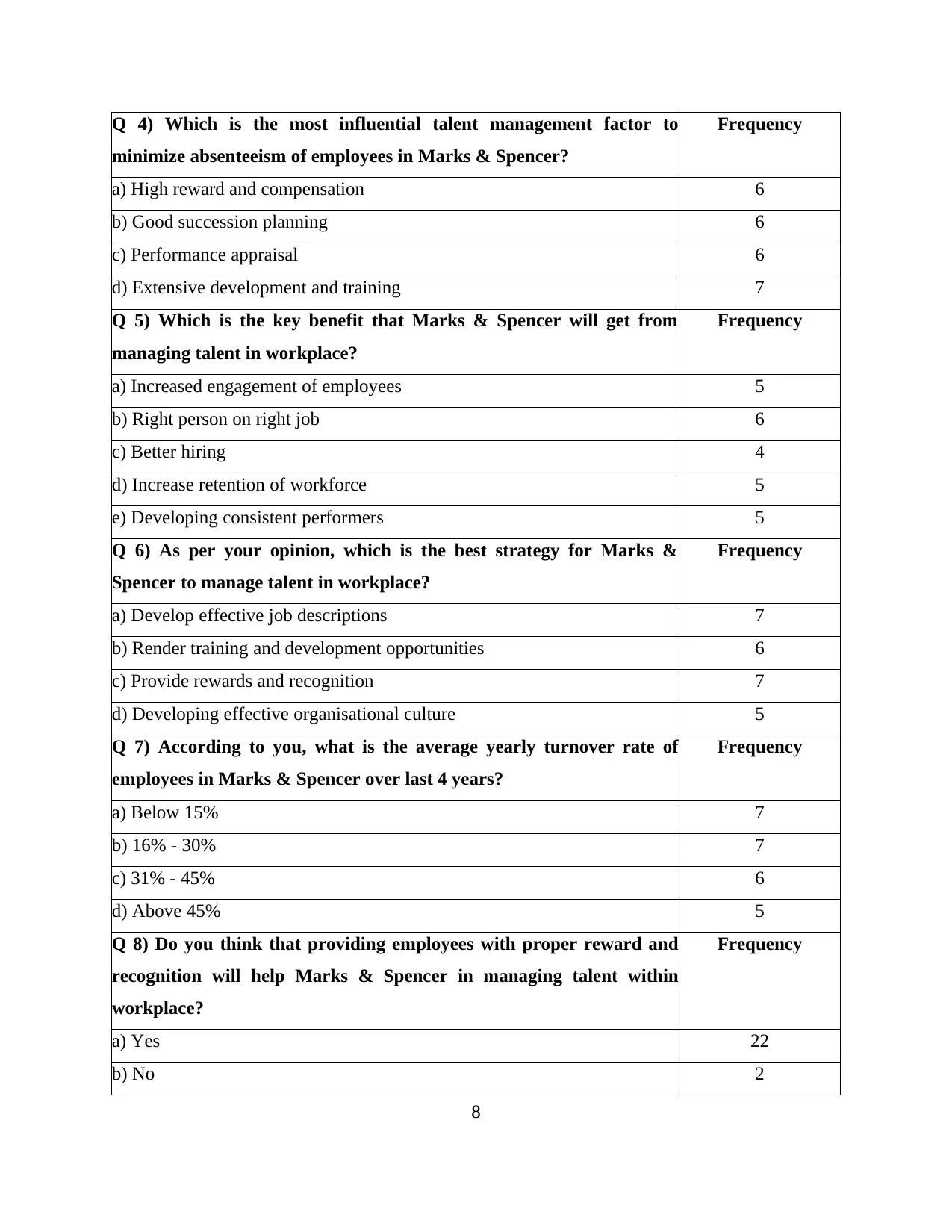
Q 4) Which is the most influential talent management factor to
minimize absenteeism of employees in Marks & Spencer?
Frequency
a) High reward and compensation 6
b) Good succession planning 6
c) Performance appraisal 6
d) Extensive development and training 7
Q 5) Which is the key benefit that Marks & Spencer will get from
managing talent in workplace?
Frequency
a) Increased engagement of employees 5
b) Right person on right job 6
c) Better hiring 4
d) Increase retention of workforce 5
e) Developing consistent performers 5
Q 6) As per your opinion, which is the best strategy for Marks &
Spencer to manage talent in workplace?
Frequency
a) Develop effective job descriptions 7
b) Render training and development opportunities 6
c) Provide rewards and recognition 7
d) Developing effective organisational culture 5
Q 7) According to you, what is the average yearly turnover rate of
employees in Marks & Spencer over last 4 years?
Frequency
a) Below 15% 7
b) 16% - 30% 7
c) 31% - 45% 6
d) Above 45% 5
Q 8) Do you think that providing employees with proper reward and
recognition will help Marks & Spencer in managing talent within
workplace?
Frequency
a) Yes 22
b) No 2
8
minimize absenteeism of employees in Marks & Spencer?
Frequency
a) High reward and compensation 6
b) Good succession planning 6
c) Performance appraisal 6
d) Extensive development and training 7
Q 5) Which is the key benefit that Marks & Spencer will get from
managing talent in workplace?
Frequency
a) Increased engagement of employees 5
b) Right person on right job 6
c) Better hiring 4
d) Increase retention of workforce 5
e) Developing consistent performers 5
Q 6) As per your opinion, which is the best strategy for Marks &
Spencer to manage talent in workplace?
Frequency
a) Develop effective job descriptions 7
b) Render training and development opportunities 6
c) Provide rewards and recognition 7
d) Developing effective organisational culture 5
Q 7) According to you, what is the average yearly turnover rate of
employees in Marks & Spencer over last 4 years?
Frequency
a) Below 15% 7
b) 16% - 30% 7
c) 31% - 45% 6
d) Above 45% 5
Q 8) Do you think that providing employees with proper reward and
recognition will help Marks & Spencer in managing talent within
workplace?
Frequency
a) Yes 22
b) No 2
8
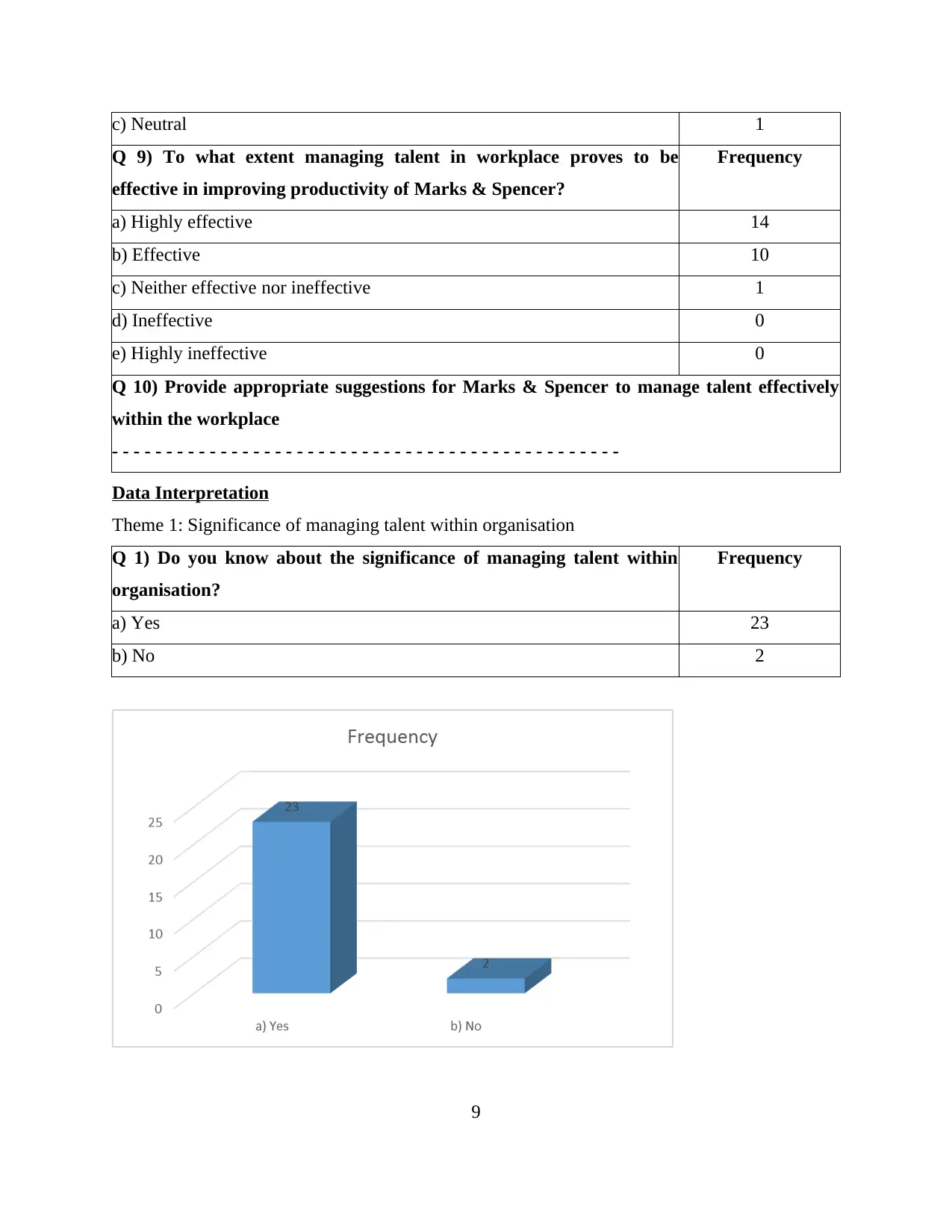
c) Neutral 1
Q 9) To what extent managing talent in workplace proves to be
effective in improving productivity of Marks & Spencer?
Frequency
a) Highly effective 14
b) Effective 10
c) Neither effective nor ineffective 1
d) Ineffective 0
e) Highly ineffective 0
Q 10) Provide appropriate suggestions for Marks & Spencer to manage talent effectively
within the workplace
- - - - - - - - - - - - - - - - - - - - - - - - - - - - - - - - - - - - - - - - - - - - - - -
Data Interpretation
Theme 1: Significance of managing talent within organisation
Q 1) Do you know about the significance of managing talent within
organisation?
Frequency
a) Yes 23
b) No 2
9
Q 9) To what extent managing talent in workplace proves to be
effective in improving productivity of Marks & Spencer?
Frequency
a) Highly effective 14
b) Effective 10
c) Neither effective nor ineffective 1
d) Ineffective 0
e) Highly ineffective 0
Q 10) Provide appropriate suggestions for Marks & Spencer to manage talent effectively
within the workplace
- - - - - - - - - - - - - - - - - - - - - - - - - - - - - - - - - - - - - - - - - - - - - - -
Data Interpretation
Theme 1: Significance of managing talent within organisation
Q 1) Do you know about the significance of managing talent within
organisation?
Frequency
a) Yes 23
b) No 2
9
⊘ This is a preview!⊘
Do you want full access?
Subscribe today to unlock all pages.

Trusted by 1+ million students worldwide
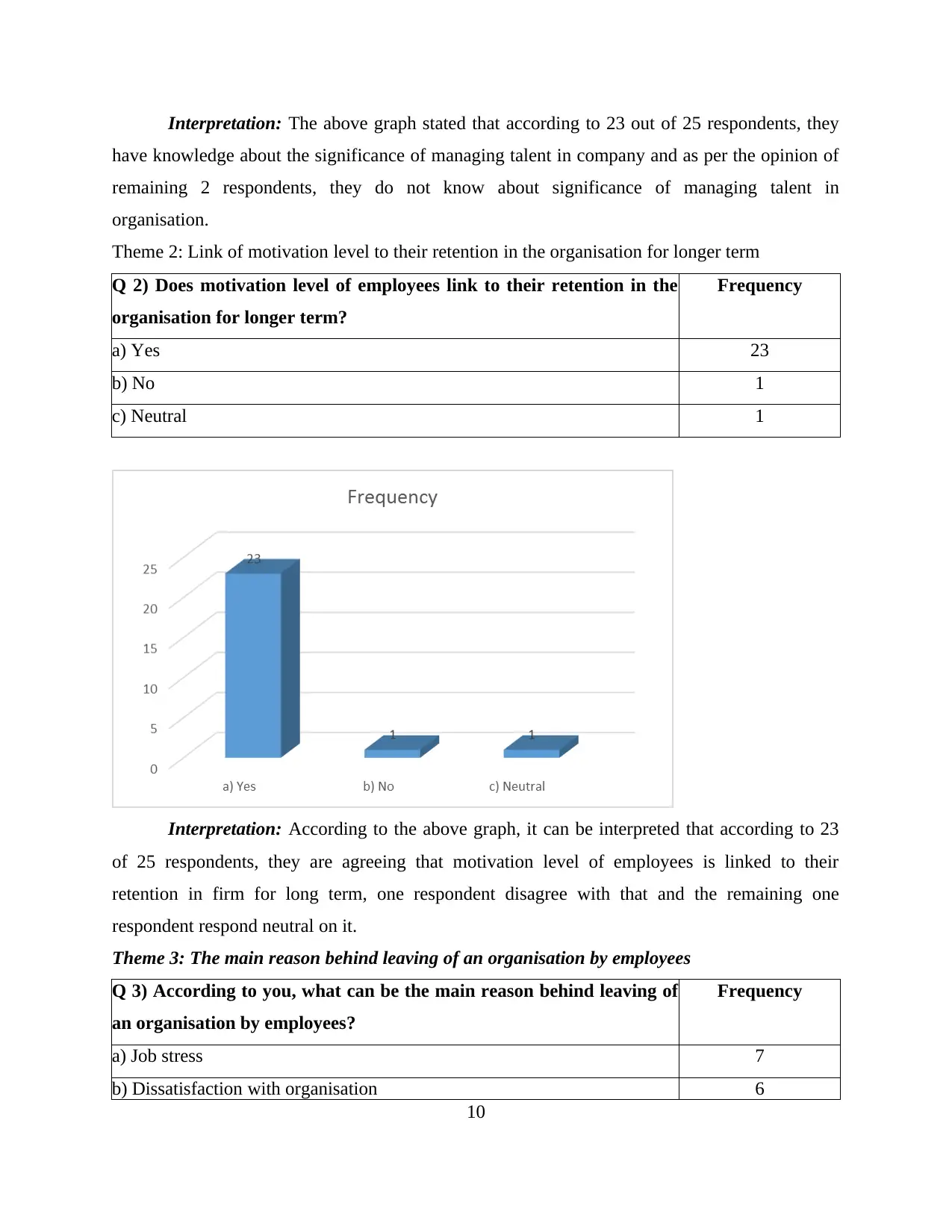
Interpretation: The above graph stated that according to 23 out of 25 respondents, they
have knowledge about the significance of managing talent in company and as per the opinion of
remaining 2 respondents, they do not know about significance of managing talent in
organisation.
Theme 2: Link of motivation level to their retention in the organisation for longer term
Q 2) Does motivation level of employees link to their retention in the
organisation for longer term?
Frequency
a) Yes 23
b) No 1
c) Neutral 1
Interpretation: According to the above graph, it can be interpreted that according to 23
of 25 respondents, they are agreeing that motivation level of employees is linked to their
retention in firm for long term, one respondent disagree with that and the remaining one
respondent respond neutral on it.
Theme 3: The main reason behind leaving of an organisation by employees
Q 3) According to you, what can be the main reason behind leaving of
an organisation by employees?
Frequency
a) Job stress 7
b) Dissatisfaction with organisation 6
10
have knowledge about the significance of managing talent in company and as per the opinion of
remaining 2 respondents, they do not know about significance of managing talent in
organisation.
Theme 2: Link of motivation level to their retention in the organisation for longer term
Q 2) Does motivation level of employees link to their retention in the
organisation for longer term?
Frequency
a) Yes 23
b) No 1
c) Neutral 1
Interpretation: According to the above graph, it can be interpreted that according to 23
of 25 respondents, they are agreeing that motivation level of employees is linked to their
retention in firm for long term, one respondent disagree with that and the remaining one
respondent respond neutral on it.
Theme 3: The main reason behind leaving of an organisation by employees
Q 3) According to you, what can be the main reason behind leaving of
an organisation by employees?
Frequency
a) Job stress 7
b) Dissatisfaction with organisation 6
10
Paraphrase This Document
Need a fresh take? Get an instant paraphrase of this document with our AI Paraphraser
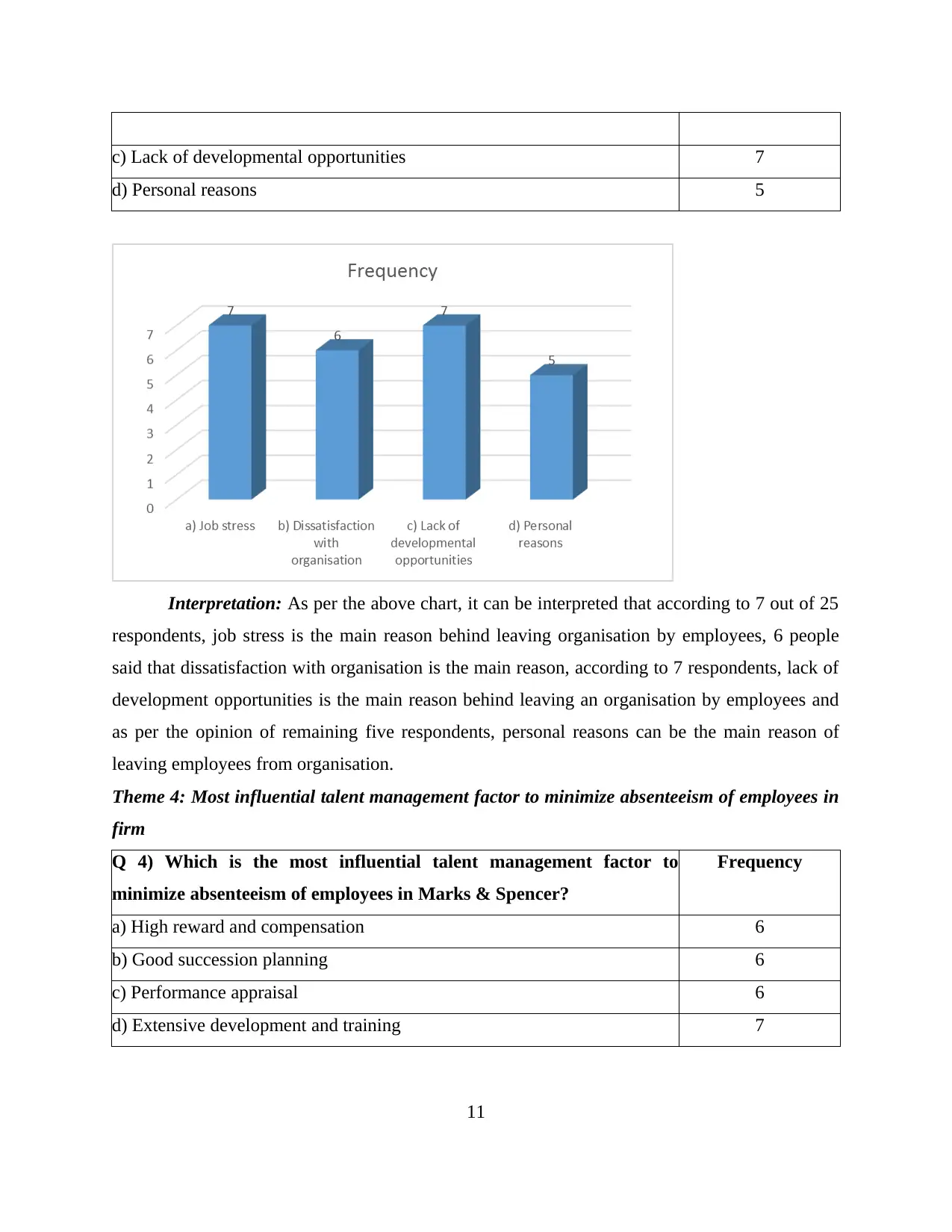
c) Lack of developmental opportunities 7
d) Personal reasons 5
Interpretation: As per the above chart, it can be interpreted that according to 7 out of 25
respondents, job stress is the main reason behind leaving organisation by employees, 6 people
said that dissatisfaction with organisation is the main reason, according to 7 respondents, lack of
development opportunities is the main reason behind leaving an organisation by employees and
as per the opinion of remaining five respondents, personal reasons can be the main reason of
leaving employees from organisation.
Theme 4: Most influential talent management factor to minimize absenteeism of employees in
firm
Q 4) Which is the most influential talent management factor to
minimize absenteeism of employees in Marks & Spencer?
Frequency
a) High reward and compensation 6
b) Good succession planning 6
c) Performance appraisal 6
d) Extensive development and training 7
11
d) Personal reasons 5
Interpretation: As per the above chart, it can be interpreted that according to 7 out of 25
respondents, job stress is the main reason behind leaving organisation by employees, 6 people
said that dissatisfaction with organisation is the main reason, according to 7 respondents, lack of
development opportunities is the main reason behind leaving an organisation by employees and
as per the opinion of remaining five respondents, personal reasons can be the main reason of
leaving employees from organisation.
Theme 4: Most influential talent management factor to minimize absenteeism of employees in
firm
Q 4) Which is the most influential talent management factor to
minimize absenteeism of employees in Marks & Spencer?
Frequency
a) High reward and compensation 6
b) Good succession planning 6
c) Performance appraisal 6
d) Extensive development and training 7
11
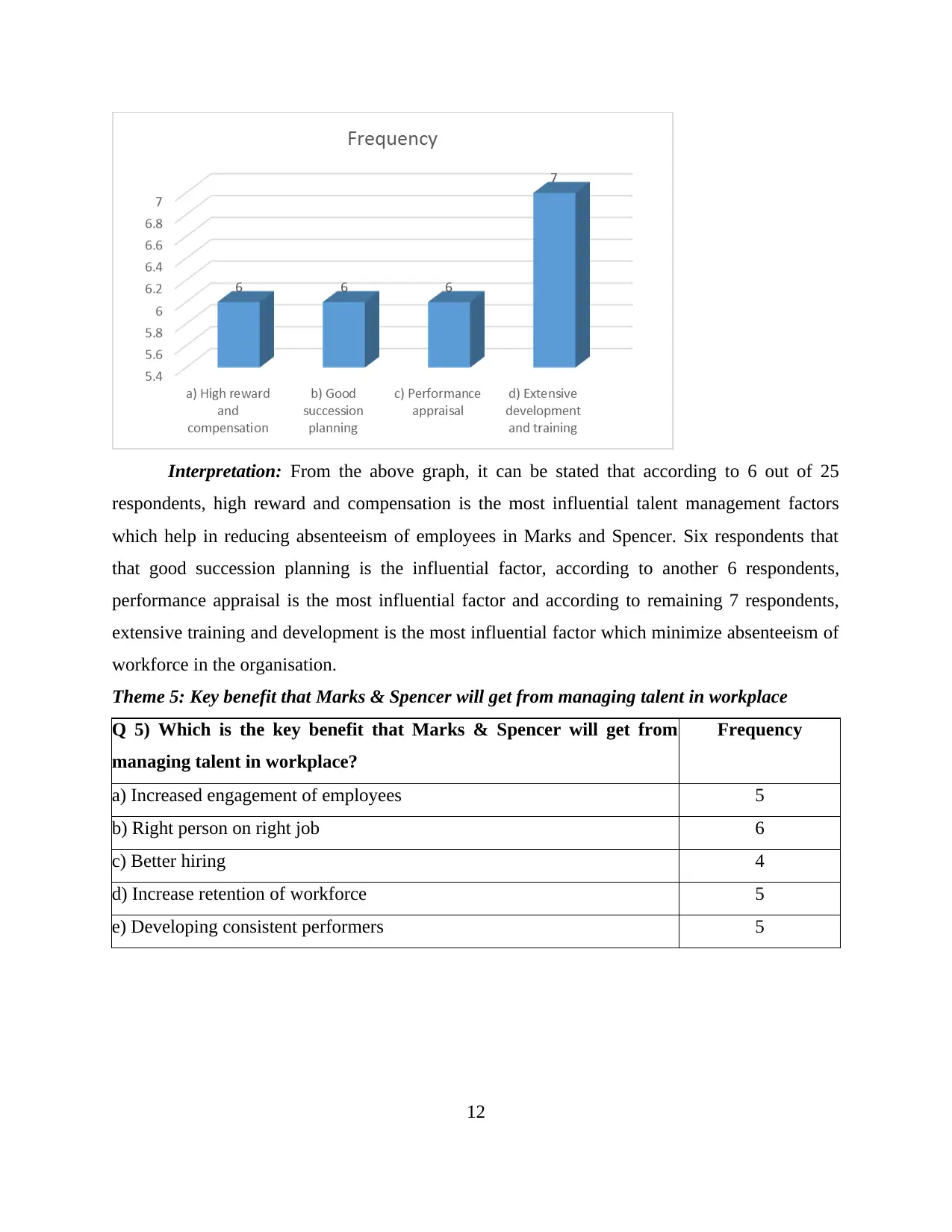
Interpretation: From the above graph, it can be stated that according to 6 out of 25
respondents, high reward and compensation is the most influential talent management factors
which help in reducing absenteeism of employees in Marks and Spencer. Six respondents that
that good succession planning is the influential factor, according to another 6 respondents,
performance appraisal is the most influential factor and according to remaining 7 respondents,
extensive training and development is the most influential factor which minimize absenteeism of
workforce in the organisation.
Theme 5: Key benefit that Marks & Spencer will get from managing talent in workplace
Q 5) Which is the key benefit that Marks & Spencer will get from
managing talent in workplace?
Frequency
a) Increased engagement of employees 5
b) Right person on right job 6
c) Better hiring 4
d) Increase retention of workforce 5
e) Developing consistent performers 5
12
respondents, high reward and compensation is the most influential talent management factors
which help in reducing absenteeism of employees in Marks and Spencer. Six respondents that
that good succession planning is the influential factor, according to another 6 respondents,
performance appraisal is the most influential factor and according to remaining 7 respondents,
extensive training and development is the most influential factor which minimize absenteeism of
workforce in the organisation.
Theme 5: Key benefit that Marks & Spencer will get from managing talent in workplace
Q 5) Which is the key benefit that Marks & Spencer will get from
managing talent in workplace?
Frequency
a) Increased engagement of employees 5
b) Right person on right job 6
c) Better hiring 4
d) Increase retention of workforce 5
e) Developing consistent performers 5
12
⊘ This is a preview!⊘
Do you want full access?
Subscribe today to unlock all pages.

Trusted by 1+ million students worldwide
1 out of 24
Related Documents
Your All-in-One AI-Powered Toolkit for Academic Success.
+13062052269
info@desklib.com
Available 24*7 on WhatsApp / Email
![[object Object]](/_next/static/media/star-bottom.7253800d.svg)
Unlock your academic potential
Copyright © 2020–2026 A2Z Services. All Rights Reserved. Developed and managed by ZUCOL.




